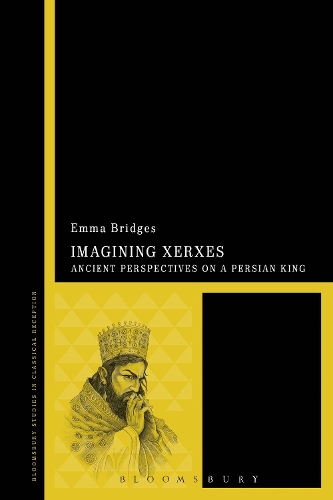
Imagining Xerxes: Ancient Perspectives on a Persian King
(Hardback)
Available Formats
Publishing Details
Imagining Xerxes: Ancient Perspectives on a Persian King
By (Author) Emma Bridges
Bloomsbury Publishing PLC
Bloomsbury Academic
20th November 2014
United Kingdom
Classifications
Tertiary Education
Non Fiction
Asian history
935.705092
Physical Properties
Hardback
256
Width 156mm, Height 234mm
526g
Description
Xerxes, the Persian king who invaded Greece in 480 BC, quickly earned a notoriety that endured throughout antiquity and beyond. The Greeks historical encounter with this eastern king which resulted, against overwhelming odds, in the defeat of the Persian army has inspired a series of literary responses to Xerxes in which he is variously portrayed as the archetypal destructive and enslaving aggressor, as the epitome of arrogance and impiety, or as a figure synonymous with the exoticism and luxury of the Persian court. Imagining Xerxes is a transhistorical analysis that explores the richness and variety of Xerxes afterlives within the ancient literary tradition. It examines the earliest representations of the king, in Aeschylus tragic play Persians and Herodotus historiographical account of the Persian Wars, before tracing the ways in which the image of Xerxes was revisited and adapted in later Greek and Latin texts. The author also looks beyond the Hellenocentric viewpoint to consider the construction of Xerxes image in the Persian epigraphic record and the alternative perspectives on the king found in the Jewish written tradition. Analysing these diverse representations of Xerxes, this title explores the reception of a key figure in the ancient world and the reinvention of his image in a remarkable array of cultural and historical contexts.
Reviews
Bridges well demonstrates the remarkable longevity that the ideologically-charged figure of Xerxes enjoyed in Greek and Roman literature over a span of almost a thousand years. One of the most valuable aspects of Bridges book is its marshalling of such a great variety of Greek and Roman texts that deal with Xerxes. -- David Branscome, Florida State University, USA * Classical Journal *
[A] fascinating and compendious survey of ancient attitudes to Xerxes. * The Spectator *
A fresh and rewarding approach to some familiar (and some less so) material ... [and a] rewarding study. * Classics Ireland *
This book convincingly illustrates the significance of the early Xerxes traditions found in Aeschylus and Herodotus, and the enduring interest in the Great King throughout classical antiquity. It will also serve as a vital starting point for those who wish to consider further ancient responses to Persian kingship, and might well inspire further inquiry into post-classical receptions of Xerxes and the Achaemenid dynasty. * The Journal of Hellenic Studies *
Bridges tracks her subject tenaciously through what survives of the ancient material and discusses an impressive range of evidence ... Bridges uses concise and elegant prose and has a facility for swift but comprehensive introductions. * International Journal of the Classical Tradition *
This readable book is highly recommended to anyone interested in cultural history, especially those who study the Greco-Roman portrayals of ancient Iranian history. * TYCHE (Bloomsbury Translation) *
Few events left such a vivid impression on history as the invasion of Greece by Xerxes, King of Persia. In this lively, erudite and nuanced cultural history of the ancient portraits of Xerxes, Emma Bridges throws fresh new light on the ancient and modern western images of Asia and its archetypal ruler. -- Edith Hall, Professor of Classics, King's College London, UK
The central concern of Dr Bridges' original and challenging exercise in ancient reception-studies is to explore the richness and variety of Persian Great King Xerxes afterlives within a diverse and complex literary tradition. This is a powerfully written and conceptually sophisticated treatment of an important topic within classical studies, which has the added appeal of including an excellent discussion of the cinematic reception of Xerxes in the 21st century. -- Paul Cartledge is the A.G. Leventis Professor of Greek Culture, University of Cambridge, UK
What to make of Xerxes Ruthless tyrant Hubris personified Prisoner of history Glorious war-lord Victim of fortune Decadent playboy Lubricious harem-master Or just the foil for Greece's glory, the great invader who brought out the best in those freedom-fighters of 480 BCE He was all of those things, and Emma Bridges' beautifully written book traces all the shifts in the ideas and stories and fantasies that later generations wove as they dwelt on Greece's finest hour. -- Christopher Pelling, Regius Professor of Greek, Oxford University, UK
Author Bio
Emma Bridges is an Associate Lecturer in Classics at the Open University, UK.
